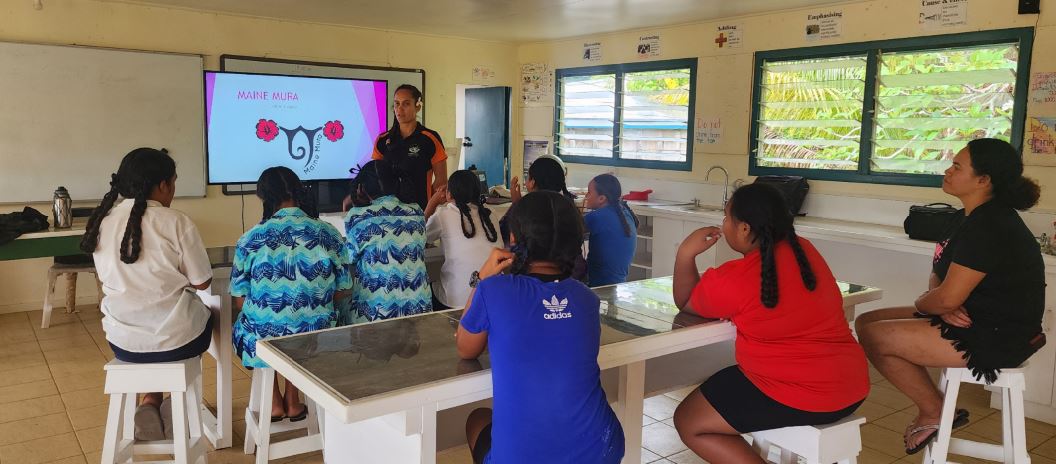Te Ipukarea Society continues its periodic programme
Saturday 25 November 2023 | Written by Te Ipukarea Society | Published in Environment, National

Te Ipukarea Society Director Alanna Smith delivering a presentation on Maine Mura at Apii Mauke. 23112406
Here in the Cook Islands, and more specifically in the Pa Enua, young girls experiencing the menstrual cycle for the first time can find it quite overwhelming.
It is not a topic that is often spoken about openly.
Our Te Ipukarea Society team with the support of the Cook Islands Family Welfare Association has made it our duty to spread awareness so that our young girls and teenagers feel comfortable and safe discussing their experiences.
The menstrual cycle is a regulatory system of the female body. Thus, it is of great importance that our young girls understand that it is a normal occurrence to allow our bodies to keep functioning at the optimum.
In Rarotonga, it is common for our year 9 and 10 students to be provided with information around sex education and the menstrual cycle as it is near the age of sexual maturity. The discussion around the menstrual cycle is normalised and young girls have an opportunity to express any concerns and share experiences with one another.
Unlike Rarotonga, education in the Pa Enua around the subject is discrete and brief, possibly leading to an unclear and awkward environment for the girls. Some girls may even miss important days at school because of their period.’
Dating back to the beginning of 2021, the Maine Mura project came into action with the mission of creating a safe environment for young girls to learn about what the menstrual cycle is, and how to stay hygienic during a cycle. It had the added benefit for our fragile environment of reducing the amount of waste that ends up in our landfills, helping to fulfil one of Te Ipukarea Society’s core objectives.
The project took off with the launch of our reusable pads. These are colourful cloth pads from the New Zealand Days for Girls programme. They are washing machine friendly as a step into the green direction with an economical benefit on the side. They were introduced to all three high schools in Rarotonga.
Taking full advantage of the “Taua e Moana” ocean health voyage on our traditional vaka Marumaru Atua later that same year, the Maine Mura programme was extended to the Pa Enua high schools. Prior to departure we expanded our range of feminine hygiene products to also include reusable menstrual (moon) cups.
The average price of disposable pads in Rarotonga is between $5 and $11 per pack depending on brand and flow (heavy or light). In the Pa Enua the prices rise to compensate for the extra shipping and smaller markets, and considerable amounts of money are spent each month on disposable products.
The various aspects of personal health, environment benefits and costs are included in the presentations we give to the students during our Pa Enua visits.
Since the inception of the Maine Mura programme in 2020, with our original successful project proposal to UN Women, we have had a number of other sponsors such as the Days for Girls New Zealand programme and the Social Impact Fund from the Cook Islands Ministry of Internal Affairs.
We have progressed to also providing menstrual underwear (period undies). This called for a second offer of presentations around the high schools in Rarotonga as well as our intermediate students who would soon be leaving primary level for high school, so that they are made aware of the options that are available for them.
We have now conducted Maine Mura presentations in all of the islands of the Cook Islands, with the exception of Nassau, where the weather conditions did not allow us to get ashore.
Overall, there have been over 600 students and a handful of adults that have tried out reusable feminine hygiene products through our programme. With the number of positive responses received, it is clear that Maine Mura has had an impact, and can be considered a success. Though our funding is exhausted, we hope to continue to roll out the programme in Rarotonga and the Pa Enua with follow-up visits when the opportunities for outer island travel arise for our other projects.
You can learn more about our work in caring for our environment on our website: tiscookislands.org and our Facebook: @tiscookislands.









































